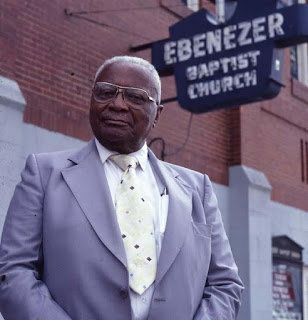King, Sr. was born Michael King on 19 December 1897, in Stockbridge, Georgia. The eldest son of James and Delia King, King, Sr. attended school from three to five months a year at the Stockbridge Colored School. ‘‘We had no books, no materials to write with, and no blackboard,’’ he wrote, ‘‘But I loved going’’ (King, Sr., 37).
King experienced a number of brutal incidents while growing up in the rural South, including witnessing the lynching of a black man. On another occasion he had to subdue his drunken father who was assaulting his mother. His mother took the children to Floyd Chapel Baptist Church to ‘‘ease the harsh tone of farm life’’ according to King (King, Sr., 26). Michael grew to respect the few black preachers who were willing to speak out against racial injustices, despite the risk of violent white retaliation. He gradually developed an interest in preaching, initially practicing eulogies on the family’s chickens. By the end of 1917, he had decided to become a minister.
In the spring of 1918, King left Stockbridge to join his sister, Woodie, in Atlanta.
The following year, Woodie in Atlanta. The following year, Woodie King boarded at the home of A. D. Williams, minister of Ebenezer Baptist Church. King seized the opportunity to introduce himself to the minister’s daughter, Alberta Williams. Her parents welcomed King into the family circle, eventually treating him as a son and encouraging the young minister to overcome his educational limitations....
From Public Boardcasting: (click here for audio)
Not unlike many Americans in the late 1800 and early 1900s their birth dates are not necessarily accurate.
Martin Luther King, SENIOR faced Jim Crow and racism early in his life. He was born in 1897 one year after the Supreme Court’s Plessy v. Fergusson decision that upheld the “separate but equal” doctrine.
As a young man during the early 1900s, King “known by many today as Daddy King” was inspired by local ministers who risked speaking out against racial injustice. He decided to become a minister and -eventually — a civil rights activist.
King headed Atlanta’s Civic and Political League and NAACP. He organized voting rights rallies and worked to initiate equal pay for Atlanta black teachers.
A supporter of former governor Jimmy Carter, King was instrumental in garnering the support of civil rights activists for Carter’s bid for the Presidency. Carter asked King to deliver invocations at both the 1976 and 1980, Democratic National Conventions.
But perhaps King, Sr.’s most significant contribution to Atlanta and the civil rights movement was the influence he had on the development of Martin Luther King, Jr. WHO once said of his father, “He set forth a noble example that I didn’t mind following.”


